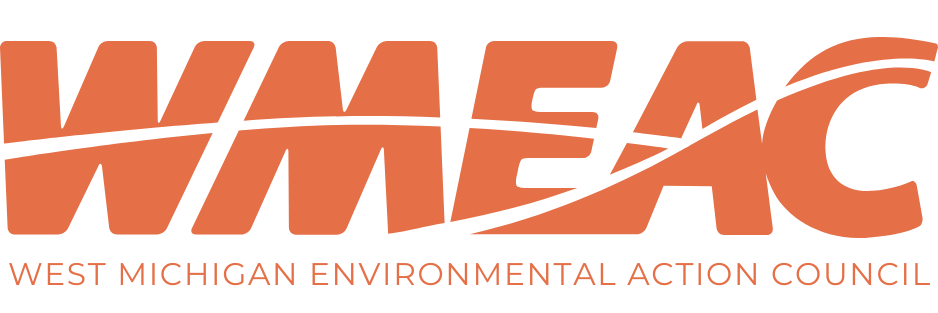Written by: Sarah Gibes
WMEAC’s 2020 Annual Meeting was held virtually on January 27. Despite the tumult of 2020, WMEAC continued to lead and support climate action throughout West Michigan. In addition to successfully transitioning traditionally in-person programs to digital formats, WMEAC expanded educational programs, fostered community activism along the lakeshore, and led a socially-distant version of the annual Mayors’ Grand River Cleanup.
At the meeting, board members Bob Zylstra, Daniel Morrison and Ed Cole were re-elected. New board members Tom Christy and Ara Seo were elected. All board members serve three-year terms. Dr. Keli Christoper was also appointed to fill a one-year board vacancy.
The staff and board members reviewed the challenges WMEAC has faced during the Covid-19 pandemic. The staff worked to produce content and programming virtually since the beginning of the pandemic. This allowed WMEAC to strengthen existing community partnerships and expand online programming opportunities. From virtual education programs to a virtual fundraising gala, the pandemic increased WMEAC’s creativity and ability to reach the community despite challenging circumstances.
In February 2020, WMEAC hired a lakeshore-focused staff member, Tanya Cabala, based in Muskegon, to increase the level of investment in community environmental action along the lake. She successfully implemented a virtual climate change book chat and encouraged community climate activists.
As a result of WMEAC’s leadership, lakeshore activists were provided with the information, tools, and assistance to take action in their own communities. Community members in northern Muskegon County organized and convinced the city of Montague to declare a climate emergency, and began to lay the groundwork for additional local declarations.
In addition to increasing activism along the lakeshore, WMEAC expanded virtual education opportunities. WMEAC was one of 29 organizations nationally that received funding from the North American Association for Environmental Education (NAAEE) to increase environmental education. With the support of NAAEE, WMEAC partnered with the Boys’ and Girls’ Club to expand environmental education opportunities in the West Michigan community.
Despite social distancing restrictions, WMEAC successfully transitioned many programs to online formats, including the Mayors’ Grand River Cleanup. 750 volunteers individually or in small groups removed over 6500 pounds of trash from the Grand River, tributaries and storm drains over a week.
In addition to transforming virtual programs to online formats, WMEAC’s IDEAL (Inclusion and Development of Environmental Allies and Leaders) committee continued its work with staff and board members to better recognize and integrate justice, specifically environmental and climate justice, through valuing and incorporating inclusion, equity, decolonization and other values. The IDEAL committee developed tools to support the Board and staff in the strategic planning effort this fall so these important values are reflected in all aspects of the plan and WMEAC can show progress and accountability.
Throughout the fall and winter of 2020, WMEAC’s board worked on strategic planning to address the challenges facing WMEAC, including the increase in virtual programming and racial and social inequities that plague communities around West Michigan. The board’s planning focused not only on addressing social and ecological issues, but also on supporting climate resiliency in communities throughout West Michigan.
In 2021, WMEAC looks forward to strengthening existing partnerships and building new relationships with the communities in West Michigan.


